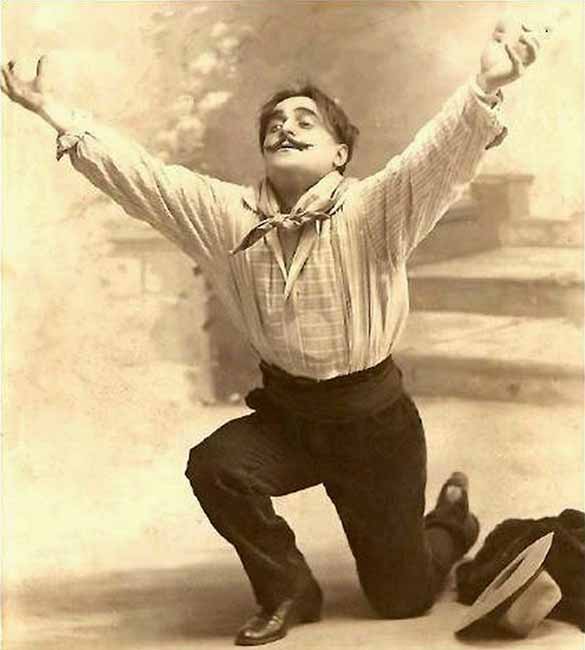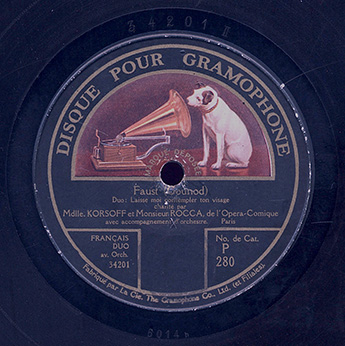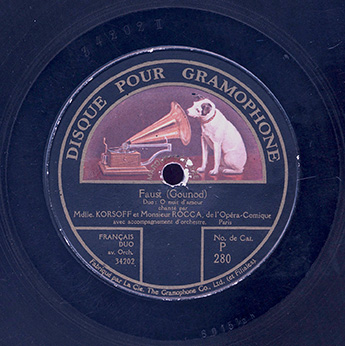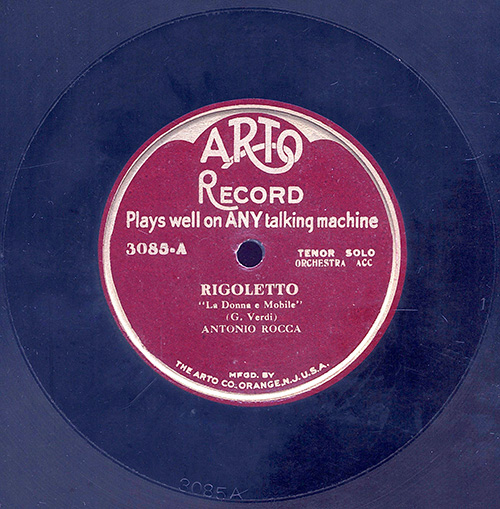Antonio Rocca

He is said to have been born in Torino 1876, and was a confectioner before starting to sing. I don't know whether
his debut took place in Italy; however, he spent almost his entire career in France, and that French career started in the
South in 1906: he sang secondary roles at the opera theater in Nice, and gave a concert in Marseille.
1907 brought about his Paris debut, at the Lyrique International, where he was one of the first three singers to be engaged for
the new troupe, together with Fjodor Shaljapin and Félia Litvinne. His next Paris debut was at the
Gaîté-Lyrique in early 1908. Subsequently, he was at the Opéra-Comique, and very successful there. At the Exposition d'Electricité in Marseille in June 1908, he participated in a highly unusual hybrid concert:
part of the singers (himself, Berthe Auguez de Montalant, Pierre d'Assy) sang in the concert hall, a lot of others (Caruso,
Shaljapin, Korsoff, Verlet, Tetrazzini, Beyle) were presented via a special gramophone with pneumatic amplification (a so-called
auxeto-gramophone), and at the end, some arias that Rocca and Auguez de Montalant had previously sung and that had been
recorded during the concert, were played once again on the auxeto-gramophone.
In November 1908, he participated in the inauguration gala concert of the new theater in Oran (Algeria). He stayed in Oran for
the whole winter season. In December, he had enormous success as Gérald, and went on to sing Werther, Rodolfo, Wilhelm
Meister, Faust, Cavaradossi, Massenet's des Grieux, Don José, Vincent, Turiddu.
Typically, Rocca got fantastic reviews wherever he sang; but as a member of the theater of Montpellier in fall 1909, he didn't
please, and on one occasion, after a few spectators had hissed, Rocca fell into a rage and started a dire confrontation with
the audience; I don't know what exactly happened, but it was the talk of the town for weeks. Certainly motivated by that
scandal, Rocca cancelled his contract and left.
In fall 1910, he sang at the Teatro Dal Verme in Milano, where he premiered La favola di Helga by Francesco
Santoliquido on 23 November, with Giorgina Caprile and Francesco Cigada; after that, he spent the Carnival season 1911 at the
theater in Cremona.
Next, I find him in Tosca in Bayonne on 21 January 1913 ("premier ténor de la Scala de Milan" – from as far
away as Bayonne, the difference between La Scala and the Dal Verme was obviously negligible), followed by Canio in
Pagliacci (or Paillasse, by Léon Cavalho, as per "Le Monde Artiste"). 20 May 1913, an aria concert in
Troyes, a triumph for Rocca, earning him a rave review in a local newspaper. Autumn 1913, Rocca becomes a member of the Toulon
opera and a permanent guest for the season in Nice. His Faust in Toulon in December was criticized for vocal fatigue, ascribed
to his frequent travels to Nice.
Rocca spent the 1915/16 season at the opera theater of Algiers. Next, a Tosca production at the Casino de la Plage in Marseille
from 28 May 1916 onwards; Rocca was once more announced as "de la Scala de Milan". In 1916, as well, he appeared also at the
Opéra de Marseille, with great success.
In 1917 and 1918, he sang at the Opéra Municipal in Algiers (for instance Werther and Duca in January and Don José
in April 1917, or Toinet in Le chemineau from 14 April 1918). Early in his Algiers tenure, during the first week of
February 1917, he had another "unpleasant incident" that reminds of the Montpellier scandal a few years earlier. I don't know
what exactly happened, but he wanted to cancel his contract, and could only be dissuaded from doing so by the management "coming
his way" and appointing a new First Conductor.
On 4 September 1917, he was in Bordeaux, where he sang Cavaradossi at the Théâtre Français, in Italian,
conducted by Leoncavallo and allegedly staged by the troupe of La Scala (if true, this was a belated justification for having
so often been billed as "M. Rocca de la Scala de Milan"). In June 1918, he sang in Oran.
For the Easter season 1920, he was the lead tenor at the Casino Municipal in Biarritz ("probable repertory", as per the
announcements: Carmen, Faust, Bohème, Tosca, Pagliacci, Favorite, Traviata).
In 1921, he sang (and recorded) in the USA, where he was first in Washington D.C., appearing at the National Theater, and then
a member of the Chicago Opera in autumn.
Next, there is a not quite negligible gap in Rocca's biography, of no less than eleven years... He resurfaces in 1932: in
September, he joined the troupe of the theater of Cherbourg (under a new management); for instance, he sang Duca there in
October, and Faust in November, which latter was an utter failure. That same November 1932 in Saint-Étienne, he appeared
in a new play with incidental music, "Les briseurs d'ailes", and that's the last reference to him that I can find.
Trying to sum it up, it's somewhat surprising that after his spectacularly promising beginnings, he made a nice but certainly
medium-sized career, in no way up to the prominence of his first years (and recordings!), nor to the absolutely electrified
enthusiasm with which most audiences and critics met him. I guess he was difficult to work with, irascible, unreliable. See his
Montpellier and Algiers scandals, but also the way he treated "his" theater in Toulon by singing in Nice at least as often as
there.
Rocca is a striking example (perhaps the most striking of all) of a singer who sang a foreign language way better than his own:
Rocca was a clearly below-average tenor in Italian, but one of the truly great when singing French; an absolutely amazing
French, by the way. (This reminds me of Natalie Dessay, who was only a shadow of her German-singing self when tackling a role
in her native French.)
References
- L'Afrique du Nord Illustrée, 7 November 1908
- Annales africaines, 19 December 1908
- Cherbourg Éclair, 25 October 1932
- The Chicago Tribune and Daily News, 12 September 1921
- Comoedia, 11 June 1908; 30 November 1910
- L'Écho d'Alger, 18 December 1915; 9 and 19 January 1917; 9 February 1917; 14 April 1917
- Evening Star, 19 February 1921
- La Gazette de Biarritz, 19 January 1913; 19 March 1920
- La Gironde, 17 August 1917
- L'Intransigeant, 12 December 1907; 8 September 1932
- Le Matin, 21 May 1907
- Mémorial de la Loire et de la Haute-Loire, 25 November 1932
- Le Mémorial des Pyrénées, 23 January 1913
- Le Monde Artiste, 15 February 1913
- Nîmes-Journal, 25 September 1909
- Les Nouvelles, 29 January 1917; 14 and 23 April 1918
- Ouest-Éclair, 12 November 1932
- Le Petit Marseillais, 27 May 1916
- Le Petit Méridional, 29 October 1909
- Le Petit Oranais, 4 June 1918
- Le Petit Provençal, 30 August 1906
- Le Temps, 22 May 1907
- La Tribune de l'Aube, 22 May 1913
- La Vie Montpelliéraine, 13 March 1909; 12 December 1909; 24 July 1910; 5 October 1913; 14 December 1913
- Washington Herald, 19 February 1921
- Washington Times, 20 February 1921
In RA format
Anton Bieber has provided the recording and the label scans: thank you!
In RA format
In RA format
I wish to thank Richard J Venezia for the recording.
Anton Bieber has provided the recording and the label scan: thank you!
Discography(most probably complete for the French, most probably incomplete for the American recordings)
Gramophone, Paris, March 1908
5582h Africaine (Meyerbeer): Pays merveilleux 3-32798
5583h unknown title unpubl
5584h unknown title unpubl
5585h unknown title unpubl
5586h unknown title unpubl
5633h Lakmé (Delibes): Ah viens dans cette paix profonde 3-32799
5634h Rigoletto (Verdi): Comme la plume au vent 3-32800
5635h Favorite (Donizetti): Ange si pur 3-32801
Gramophone, Paris, April 1908
5753h Lakmé (Delibes): Dans la forêt près de nous (w. Vallandri) 34207, P281
5754h unknown title (w. Vallandri) unpubl
597i Lakmé (Delibes): C'est le dieu de la jeunesse (w. Vallandri) 034020, W228
Gramophone, Paris, May 1908
5930h Cavalleria rusticana (Mascagni): Vive le vin unpubl
5930½h d:o 3-32837
5931h Cavalleria rusticana (Mascagni): O Lola 3-32847
5973h Manon (Massenet): Ah fuyez, douce image unpubl
5973½h d:o 3-32829, Vic 5775
5974h Tosca (Puccini): O de beautés égales 3-32830
5975h Werther (Massenet): Fantaisie aux divins mensonges 3-32831, Vic 5771, 16573
Gramophone, Paris, June 1908
6014h Faust (Gounod): Laisse-moi contempler (w. Korsoff) 34201, P280
6015h Faust (Gounod): Ô nuit d'amour (w. Korsoff) unpubl
6015½h d:o 34202, P280
612i Faust (Gounod): Oui, c'est toi je t'aime (w. Korsoff) 034022
Gramophone, Paris, about August 1908
6255h Favorite (Donizetti): Un ange, une femme inconnue 3-32862
6256h Tosca (Puccini): Le ciel luisait d'etoiles 3-32854
6257h Carmen (Bizet): Dragon de l'Alcala 3-32855
832i Faust (Gounod): Mais ce Dieu (w. d'Assy) 034024, W229
833i Faust (Gounod): À moi les plaisirs (w. d'Assy) 034025, W229
836i Faust (Gounod): Salut, demeure 032083
837i Joseph (Méhul): Champs paternels 032084
Gramophone, Paris, October 1908
6497h Faust (Gounod): Anges purs (w. Auguez de Montalant & d'Assy) 34208
6497½h d:o 34208x, P363
6498h Lakmé (Delibes): D'où viens-tu (w. Korsoff) 34209
6506h Rigoletto (Verdi): Qu'une belle 3-32878
860i Faust (Gounod): Divine pureté (w. Korsoff & d'Assy) 034027
861i unknown title unpubl
862i Carmen (Bizet): La fleur 032090
Gramophone, Paris, 14 April 1909
14568u Mireille (Gounod): Anges du paradis unpubl
Gramophone, Paris, 3 June 1909
01050v Guillaume Tell (Rossini): Asile héréditaire unpubl
01050½v Guillaume Tell (Rossini): Asile héréditaire unpubl
01051v Mireille (Gounod): Anges du paradis (w. chorus) 032163
Gramophone, Paris, 7 June 1909
01065v Roméo et Juliette (Gounod): Dieu qui fit l'homme à son image 034075, W333
(w. Bakkers & Journet)
Gramophone, Paris, 9 June 1909
01074v Faust (Gounod): Choeur des soldats (w Bakkers) unpubl
01075v d:o unpubl
01076v Mireille (Gounod): Le val d'enfer (w Bakkers) unpubl
01077v La Favorite (Donizetti): Vois mes pleurs (w Auguez de Montalant)unpubl
14928u Faust (Gounod): Trio final (w Auguez de Montalant & d'Assy) unpubl
Edison cylinders, Paris, 1912 or 1913
44660 test recording: Arpeggios unpubl
44911 Martha (Flotow): M'apparì 44911
44920 La Gioconda (Ponchielli): Cielo e mar 44920
Gramophone, Paris, 20 May 1914
18800u Tosca (Puccini): O de beautés égales unpubl
18801u Tosca (Puccini): Le ciel luisait d'étoiles unpubl
Bell, USA about 1921
Pagliacci (Leoncavallo): Vesti la giubba S-107-A
Fanciulla del West (Puccini): Ch'ella mi creda S-107-B
Critona, New York about 1921
Fanciulla del West (Puccini): Ch'ella mi creda 1027
Trovatore (Verdi): Di quella pira
Arto, USA 1922
Rigoletto (Verdi): La donna è mobile 3083
Cavalleria rusticana (Mascagni): Brindisi 3086
I wish to thank Christian Torrent for the discography and the picture.
Additions to the discography from Gesellschaft für historische Tonträger, Wien
|



